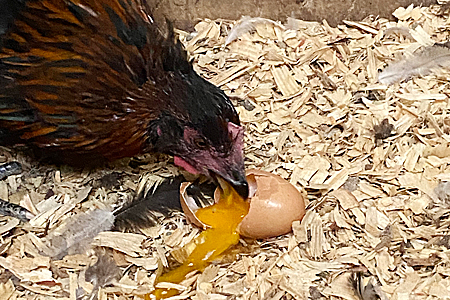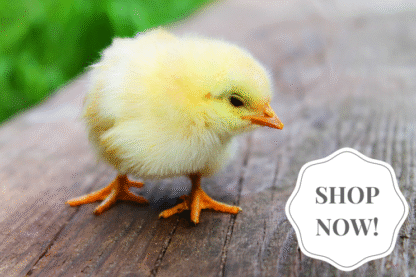
Egg eating is a nasty habit that, left unchecked, can spread from one hen to many or even all the hens in the flock. Not only do you lose eggs, you also end up with messy egg residue in the nests. Here are 10 reasons hens eat their own eggs, and how to stop them.
Thin Shells
A common way hens get started eating their own eggs is when eggs get broken in the nest. Once chickens find out how good eggs taste, they break them on purpose to eat them.
The typical cause of broken eggs is unusually thin shells. Thin shells may cover a pullet’s first few eggs. They also tend to occur when spring production peaks, and when the weather is especially warm.
Because a hen’s eggs get larger as she gets older, the same amount of shell gets stretched into a thinner, weaker layer. Thin shells also may be due to a hereditary defect or to some disease, such as infectious bronchitis.
Too Few Nests
Eggs can get broken when not enough nests are provided. Eggs may accumulate in the nest and get trampled. Or more than one hen may try to crowd into a nest at the same time, breaking eggs already there.
Furnish at least one nest for every four to five hens in your flock. And collect eggs often, since eggs that accumulate invite breakage.
Wrong Size Nests
Any nest large enough to accommodate more than one hen at a time can lead to broken eggs. Individual nests are therefore preferable.
A good nest size for Leghorn-size layers is 12 inches wide by 14 inches high by 12 inches deep. For heavier breeds, make nests 14 inches wide by 14 inches high by 12 inches deep; for bantams, 10 inches wide by 12 inches high by 10 inches deep.
Improperly Placed Nests
Eggs may get broken in nests that are too low to the ground, attracting chickens to scratch or peck in them, thus dirtying or breaking eggs. Raise the nests 18 to 20 inches off the ground by setting them on a platform or firmly attaching them to the wall.
Poor Nesting Material
Clean, soft nesting material helps prevent eggs from getting cracked in the nest. Even if an appropriate nest liner is used, eggs can break if the material gets packed down or pushed out of the nest when hens exit.
A 4-inch sill along the front edge of each nest will help hold in nesting material. A sill also prevents eggs from rolling out of the nest and breaking when they hit the floor. Change nest material as often as necessary to keep eggs clean and unbroken.
Bright Light
Hens like to lay their eggs in dark, out-of-the-way places. To encourage hens to lay in the nests, while discouraging nonlaying activity, arrange nests on the darkest wall of your coop. Or shield them from light.
In a smallish and well-lit coop, discourage nonlaying activity in nests by hanging curtains in front to darken them. To prevent reluctance over entering a curtained nest, either cut curtains into hanging strips or temporarily pin up one corner until the hens get used to the curtains.
Nutritional Deficiency
A nutritional deficiency, especially of vitamin D or calcium, can cause soft shells that break easily. A hen’s calcium needs are increased by age and by warm weather. Appropriate nutritional boosters include a calcium supplement offered free choice and vitamin AD&E powder added to drinking water three times a week.
Feeding Eggshells
An eggshell consists mostly of calcium carbonate, the same stuff you feed your hens to keep their eggshells strong. So feeding hens their own eggshells for calcium is not a bad idea, with two caveats.
First, the shells should be fully dried and ground up, so the hens don’t recognize them as eggs. Second, feeding hens the shells of their own eggs does not provide enough calcium to keep shells strong. You should also offer a calcium supplement, such as crushed oyster shells or ground aragonite.
Dehydration
An egg is 65% water. A water-deprived hen could conceivably break eggs to obtain the precious moisture inside. This potential cause of egg eating is unlikely where chickens have access to plenty of fresh, clean drinking water.
Boredom or Stress
Overcrowding, boredom, and stress are other factors that can lead to egg eating. Stress induced by fright or excitement can cause a hen to expel an egg before the shell is finished, resulting in a soft or missing shell.
Bored chickens may deliberately break and eat eggs. Boredom can result from feeding layer pellets, which allow chickens to quickly satisfy their nutritional needs, leaving them little to do but look for things (like eggs) to pick at. For this reason, keepers of confined chickens prefer to feed rations in the form of crumbles, which take longer to eat and therefore are less likely to lead to boredom. Free ranging is another option.
The stress of overcrowding may also lead to broken eggs, since the most timid birds may resort to hiding in nests. An environment with lots of variety provides even the most timid flock member places to get away from potential bullies.
How to Stop Egg Eating
Despite your best management efforts, you may still occasionally end up with an egg eating hen. You’ll then need to either remove the hen from the flock, or take measures to stop the habit before it spreads.
Identifying an egg eater isn’t always easy, unless you catch her in the act. Or you might spot a hen with egg yolk smeared on her beak and feathers.
A wooden or ceramic egg can come in handy to help identify the perpetrator. Place the egg on the coop floor, then watch from a distance. The hen that steps up and repeatedly pecks the fake egg is your likely culprit.
Sometimes you can slow down an egg eater by placing wooden or ceramic eggs in the nests. Chickens quickly realize the futility of pecking at the hard objects.
If you are determined not to remove the egg-eating hen from the flock, and all else fails, consider a temporary beak trim. Using nail clippers, remove a scant one-fifth of the upper beak, which should grow back in about six weeks. The hen will still be able to eat layer ration, but will have a hard time breaking and eating her own eggs.
And that’s today’s news from the Cackle Coop.
Gail Damerow, author, Storey’s Guide to Raising Chickens

